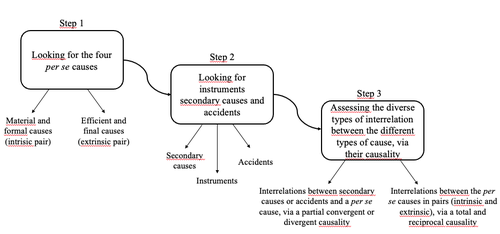
SHANAHAN Genevieve
- Management, Employment and Organisation, Cardiff Business School, Cardiff, United Kingdom
- Alternative forms of organizing, Climate Crisis , Cooperatives , Critical theory , Ethnography , Feminist studies, Gender studies , Meta-organization, Politics of knowledge, Power , Qualitative methods, Resistance, Social movements, Socio-materiality, Socio-technical studies, Sustainability & transition, Technology
- recommender
Recommendation: 1
Reviews: 0
Recommendation: 1

Embracing causal complexity: An analytical framework based on Aristotle’s conceptualization of causes and causalities
Realizing potentials: The promise of an Aristotelian approach to causal complexity
Recommended by Genevieve Shanahan based on reviews by 3 anonymous reviewersMany of the most pressing challenges we face in society seem intractable at least in part due to their complexity. The climate crisis, for instance, is the product of environmental and social systems – already complex in themselves (Dryzek, 2013) – interpenetrating across such a diversity of spatial and temporal scales as to effectively evade human comprehension and agential engagement (Morton, 2013). Yet complexity also carries with it emancipatory promise. Against understandings of the status quo as a unified, stable and self-reinforcing system, complexity-embracing perspectives draw attention to the vulnerability of existing systems of domination (Wright, 2010) as well as the emancipatory possibilities of alternative practices, both actual and potential (Elder-Vass, 2022; Gibson-Graham, 2006). Intentionally steering towards emancipatory possibilities, however, requires that we apprehend, at least to some degree, the forms of complexity that give rise to such potentialities.
The causal complexity perspective seeks to address the shortcomings of the dominant approach to explanation – the Newtonian linear model – which can be unhelpfully simplistic in a variety of domains, including those of the social sciences (Abbott, 2001; Meyer, Gaba and Colwell, 2005; Zara and Delacour, 2023). By ignoring the ways in which specific effects can depend on the conjunction of various causal conditions, including interactions across levels of analysis, and how particular causes can give rise to feedback loops, discontinuities and non-proportional effects (Delacour and Zara, 2025; Misangyi et al., 2017; Ragin, 2008), this dominant paradigm offers parsimonious causal accounts optimized for certain purposes and, for that reason, ineffective for others (Durand and Vaara, 2009; Furnari et al., 2021).
Despite the promise of the causal complexity perspective, however, the authors of “Embracing causal complexity” argue that this approach remains underutilized in organization studies due to outstanding operationalization difficulties and poor understanding of the central concepts of causes and causality (Delacour and Zara, 2025). Configurational theory scholarship has done much to incorporate causal complexity into empirical analyses, most notably through the method of Qualitative Comparative Analysis (QCA - Fiss, 2007; Furnari et al., 2021; Misangyi et al., 2017; Ragin, 2008; Schneider and Wagemann, 2012). Nevertheless, the authors argue that the value of such approaches is limited because they lack a clear ontology of causes and causation (Delacour and Zara, 2025).
The authors thus turn to Aristotle’s multivocal conceptualization of causes and causalities as the basis for their proposed three-step analytical framework. Step 1 involves identifying the four per se causes – material, formal, efficient and final – of the phenomenon under investigation. The presented illustrative analysis of a typical firm broadly corresponds to prior efforts to apply the Aristotelian framework in management scholarship (e.g., Strong, 2000). Step 2 goes further, however, using Aristotle’s categories of instruments, secondary causes and accidents to characterize the context of the phenomenon under analysis. Finally Step 3 makes use of Aristotle’s thinking regarding the different forms of causation at play in the relationships between the foregoing types of causes. According to the authors, this ontological grounding usefully advances the causal complexity perspective by accounting for why the dynamics within causal configurations are non-aggregative and tend towards non-linearity and non-proportionality.
I recommend this paper primarily because I share the authors’ belief in the need for organizational scholarship to pursue greater understanding of not just the fact of causal complexity but most importantly its underlying mechanisms. While any such apprehension will surely be partial and approximate at best, even dim improvements enhance our agential capacity to imagine and intentionally deploy the causes of new effects (Gümüsay and Reinecke, 2022; Mahoney and Goertz, 2006; Schoppek, 2021). Furthermore, the grounding in Aristotelian metaphysics in particular is auspicious for those of us interested in the reality of unrealized potentialities (Bhaskar, 2008, 2016; Elder-Vass, 2022; Shanahan, Jaumier, Daudigeos and Ouahab, 2024).
Given the ontological importance of human agency and intentionality in Aristotle’s framework (Jacobs and O’Connor, 2013), I do find curious the paper’s reluctance to use such features to more clearly demarcate, for instance, instruments from secondary causes and accidents. I also struggle to see, from the specific illustrations presented in the paper, a clear demonstration that the conceptual complexity added by the proposed framework gets us something of corresponding value in terms of explanatory power. However, I’m inclined to read the paper’s circumspect explanatory ambition as merely an artefact of the authors’ choice to prioritize simplicity and clarity to effectively illustrate the Aristotelian framework in its own right (p. 14). Most notably, the illustrations are generally constrained to a single level of analysis, taking “the firm” as its single, generic object.
I would be interested to see organization studies research building on this groundwork by exploring what the proposed Aristotelian approach might offer when applied to multiple objects of study in interaction. The example of the consultant who inadvertently reinforces the CEO’s existing inclination by deploying ineffective persuasive techniques (p. 21), for instance, hints at the potential for deeper theorization. Even limiting ourselves to a single level of analysis, might more novel insights be revealed by overlaying the existing framing, where the CEO is understood as the efficient cause, with a secondary framing that takes the consultant as the efficient cause of a separate but intersecting project? And what theorization might be made possible by overlaying such framings at multiple levels of analysis?
While references to Aristotelian thought are not particularly unusual in organization studies, Aristotle’s metaphysics has been relatively neglected within our discipline. If we accept that the pursuit of emancipatory responses to complex societal challenges requires a correspondingly complex and therefore interdisciplinary understanding of causes and causation (Ferraro, Etzion and Gehman, 2015; Geels, 2022), adopting the proposed framework could be valuable not just as a particular way of conceptualizing causal complexity, but also as a means of tapping into a productive vein of contemporary philosophical work in the Aristotelian tradition (Jacobs and O’Connor, 2013; Jansen and Sandstad, 2021; Novotný and Novák, 2014; Simpson, Koons and Teh, 2017; Tahko, 2011). The present paper is thus recommended by Peer Community in Organization Studies as an invitation to organization scholars to explore what such metaphysical approaches might reveal not just in analysis of what is, but more pressingly in exploration of what we might intentionally cause to be.
References
Abbott, Andrew (2001). Time matters: On theory and method. University of Chicago Press.
Delacour, Helene and Zara, Andreea (2025). Embracing causal complexity: An analytical framework based on Aristotle’s conceptualization of causes and causalities. Zenodo, 10300126. version 3 peer-reviewed and recommended by PCI Organization Studies. https://doi.org/10.5281/zenodo.10300126.
Bhaskar, Roy (2008). A realist theory of science. Routledge.
Bhaskar, Roy (2016). Enlightened common sense: The philosophy of critical realism. Routledge.
Dryzek, John S. (2013). The politics of the earth: Environmental discourses. Oxford University Press.
Durand, Rodolphe and Vaara, Eero (2009). Causation, counterfactuals, and competitive advantage. Strategic Management Journal, 30(12), 1245–1264. https://doi.org/10.1002/smj.793
Elder-Vass, Dave (2022). Ethics and emancipation in action: Concrete utopias. Journal of Critical Realism, 21(5), 539–551. https://doi.org/10.1080/14767430.2022.2031789
Ferraro, Fabrizio, Etzion, Dror and Gehman, Joel (2015). Tackling grand challenges pragmatically: Robust action revisited. Organization Studies, 36(3), 363–390. https://doi.org/10.1177/0170840614563742
Fiss, Peer C. (2007). A set-theoretic approach to organizational configurations. The Academy of Management Review, 32(4), 1180–1198. https://doi.org/10.5465/amr.2007.26586092
Furnari, Santi, Crilly, Donal, Misangyi, Vilmos F., Greckhamer, Thomas, Fiss, Peer C. and Aguilera, Ruth V. (2021). Capturing causal complexity: Heuristics for configurational theorizing. Academy of Management Review, 46(4), 778–799. https://doi.org/10.5465/amr.2019.0298
Geels, Frank W. (2022). Causality and explanation in socio-technical transitions research: Mobilising epistemological insights from the wider social sciences. Research Policy, 51(6), 104537. https://doi.org/10.1016/j.respol.2022.104537
Gibson-Graham, J. K. (2006). A postcapitalist politics. University of Minnesota Press.
Gümüsay, Ali Aslan and Reinecke, Juliane (2022). Researching for desirable futures: From real utopias to imagining alternatives. Journal of Management Studies, 59(1), 236–242. https://doi.org/10.1111/joms.12709
Jacobs, Jonathan D. and O’Connor, Timothy (2013). Agent causation in a neo-Aristotelian metaphysics. In S. C. Gibb, E. J. Lowe and R. D. Ingthorsson (Eds.), Mental causation and ontology (pp. 173–192). Oxford University Press. https://doi.org/10.1093/acprof:oso/9780199603770.003.0008
Jansen, Ludger and Sandstad, Petter (2021). Neo-Aristotelian perspectives on formal causation. Routledge.
Mahoney, James and Goertz, Gary (2006). A tale of two cultures: Contrasting quantitative and qualitative research. Political Analysis, 14(3), 227–249. https://doi.org/10.1093/pan/mpj017
Meyer, Alan D., Gaba, Vibha and Colwell, Kenneth A. (2005). Organizing far from equilibrium: Nonlinear change in organizational fields. Organization Science, 16(5), 456–473. https://doi.org/10.1287/orsc.1050.0135
Misangyi, Vilmos F., Greckhamer, Thomas, Furnari, Santi, Fiss, Peer C., Crilly, Donal and Aguilera, Ruth (2017). Embracing causal complexity: The emergence of a neo-configurational perspective. Journal of Management, 43(1), 255–282. https://doi.org/10.1177/0149206316679252
Morton, Timothy (2013). Hyperobjects: Philosophy and ecology after the end of the world. University of Minnesota Press.
Novotný, Daniel D. and Novák, Lukáš (2014). Neo-Aristotelian perspectives in metaphysics. Routledge.
Ragin, Charles C. (2008). Redesigning social inquiry: Fuzzy sets and beyond. University of Chicago Press.
Schneider, Carsten Q. and Wagemann, Claudius (2012). Set-theoretic methods for the social sciences: A guide to qualitative comparative analysis. Cambridge University Press.
Schoppek, Dorothea Elena (2021). How do we research possible roads to alternative futures? Theoretical and methodological considerations. Journal of Critical Realism, 20(2), 146–158. https://doi.org/10.1080/14767430.2021.1894908
Shanahan, Genevieve, Jaumier, Stephane, Daudigeos, Thibault and Ouahab, Alban (2024). Why reinvent the wheel? Materializing multiplicity to resist reification in alternative organizations. Organization Studies, 45(6), 855–879. https://doi.org/10.1177/01708406241244522
Simpson, William M. R., Koons, Robert C. and Teh, Nicholas J. (2017). Neo-Aristotelian perspectives on contemporary science. Routledge.
Strong, Kelly C. (2000). A voice from the past: Aristotle on the mission of the firm. Business and Professional Ethics Journal, 19(2), 83–94. https://doi.org/10.5840/bpej200019217
Tahko, Tuomas E. (2011). Contemporary Aristotelian metaphysics. Cambridge University Press.
Wright, Erik Olin (2010). Envisioning real utopias. London; New York: Verso.
Zara, Andrea and Delacour, Hélène (2023). Exploring the ontological origins of dualism: Towards a conjunctive structure of thought in organization studies. Scandinavian Journal of Management, 39(4), 101302. https://doi.org/10.1016/j.scaman.2023.101302